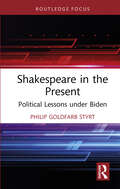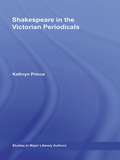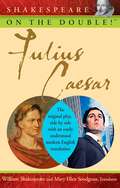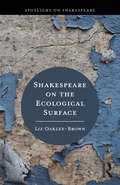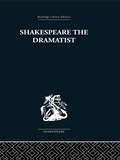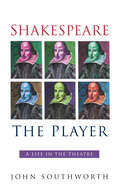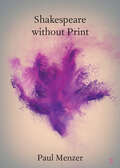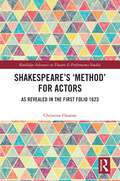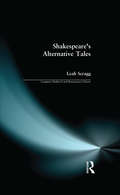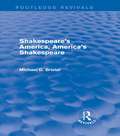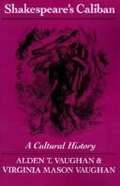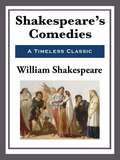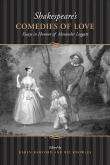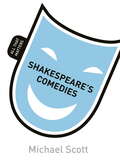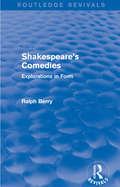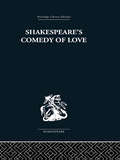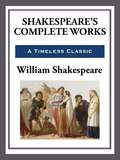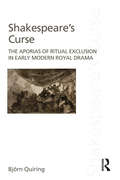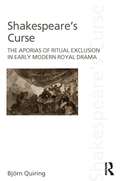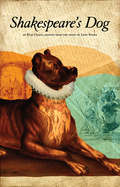- Table View
- List View
Shakespeare in the Present: Political Lessons under Biden (Routledge Focus on Literature)
by Philip Goldfarb StyrtShakespeare in the Present: Political Lessons under Biden is the first case study in applying the lessons of Shakespeare’s plays to post-Trump America. It looks at American politics through the lens of Shakespeare, not simply equating figures in the contemporary world to Shakespearean characters, but showing how the broader conditions of Shakespeare’s imagined worlds reflect and inform our own. Clearly written, in a direct and engaging style, it shows that reading Shakespeare with our contemporary Washington in mind can enrich our understanding of both his works and our world. Shakespeare wrote for his own time, but we always read him in our present. As such, the way we read him now is always affected by our own understanding of our own political world. This book provides quick critical analyses of Shakespeare’s plays and contemporary American politics while serving as an introduction for undergraduates and general readers to this kind of topical, presentist criticism of Shakespeare.
Shakespeare in the Victorian Periodicals (Studies in Major Literary Authors)
by Kathryn PrinceBased on extensive archival research, Shakespeare in the Victorian Periodicals offers an entirely new perspective on popular Shakespeare reception by focusing on articles published in Victorian periodicals. Shakespeare had already reached the apex of British culture in the previous century, becoming the national poet of the middle and upper classes, but during the Victorian era he was embraced by more marginal groups. If Shakespeare was sometimes employed as an instrument of enculturation, imposed on these groups, he was also used by them to resist this cultural hegemony.
Shakespeare in the World of Communism and Socialism
by Irena Makaryk Joseph G PriceThe works of William Shakespeare have long been embraced by communist and socialist governments. One of the central cultural debates of the Soviet period concerned repertoire, including the usefulness and function of pre-revolutionary drama for the New Man and the New Society. Shakespeare survived the byzantine twists and turns of Soviet cultural politics by becoming established early as the Great Realist whose works should be studied, translated, and emulated. This view of Shakespeare as a humanist and realist was transferred to a host of other countries including East Germany, Hungary, Poland, China, and Cuba after the Second World War.Shakespeare in the Worlds of Communism and Socialism traces the reception of Shakespeare from 1917 to 2002 and addresses the relationship of Shakespeare to Marxist and communist ideology. Irena R. Makaryk and Joseph G. Price have brought together an internationally-renowned group of theatre historians, practitioners, and scholars to examine the extraordinary conjunction of Shakespeare and ideology during a fascinating period of twentieth-century history. Roughly historical in their arrangement, the essays in this collection suggest the complicated and convoluted trajectory of Shakespeare's reputation. The general theme that emerges from this study is the deeply ambivalent nature of communist Shakespeare who, like Feste's 'chev'ril glove,' often simultaneously served and subverted the official ideology. Contributors:Alexey BartoshevitchLaura Raidonis BatesMaria Clara Versiani GaleryLawrence GuntnerWerner HabichtMaik HamburgerMartin HilskýKrystyna Kujawinska-CourtneyIrena R. MakarykZoltán MárkusSharon O'DairArkady OstrovskyJoseph G. PriceLaurence SenelickShu-hua WangRobert WeimannXiao Yang Zhang
Shakespeare on Screen
by Sarah Hatchuel Vienne-Guerrin NathalieThe first volume in the re-launched series Shakespeare on Screen is devoted to Othello, offering up-to-date coverage of recent screen versions as well as new critical essays on older, canonical films. An international cast of authors explores not only productions from the USA and UK, but also translations, adaptations and appropriations in Qu#65533;bec, Italy, India, Brazil and Mexico. The volume takes part in the ceaseless cultural investigation of what Othello says about Shakespeare, the past and our present time, supported by an invaluable film-bibliography. Accompanying free online resources include a fuller version of the bibliography and an additional contribution on YouTube versions of Othello. This book will be a valuable resource for students, scholars and teachers of film studies and Shakespeare studies.
Shakespeare on Screen Othello
by Hatchuel, Sarah and Vienne-Guerrin, Nathalie Sarah Hatchuel Nathalie Vienne-Guerrin"The first volume in the re-launched series Shakespeare on Screen is devoted to Othello, offering up-to-date coverage of recent screen versions as well as new critical essays on older, canonical films. An international cast of authors explores not only productions from the USA and UK, but also translations, adaptations and appropriations in Québec, Italy, India, Brazil and Mexico. The volume takes part in the ceaseless cultural investigation of what Othello says about Shakespeare, the past and our present time, supported by an invaluable film-bibliography. Accompanying free online resources include a fuller version of the bibliography and an additional contribution on YouTube versions of Othello. This book will be a valuable resource for students, scholars and teachers of film studies and Shakespeare studies"--
Shakespeare on the Double! Julius Caesar
by William Shakespeare Mary Ellen Snodgrass"But, for my own part, it was Greek to me. " Now you can appreciate Julius Caesar in plain English. Political intrigue. Ambition. Envy. Conspiracy. Hypocrisy. Betrayal. Assassination. Pride. Suicide. The Ides of March. The tides of war. Julius Caesar makes today's political scene seem boring! If the original text seems Greek (or geek) to you, now you can read and enjoy it in a modern translation that's easy to understand. Special aids make following the action and grasping the meaning a snap: A brief synopsis of the plot and action A comprehensive character list that describes the characteristics, motivations, and actions of each major player A visual character map that shows the relationships of major characters A cycle-of-death graphic that pinpoints the sequence of deaths and includes who dies, how they die, and why Reflective questions that help you understand the themes of the play Shakespeare on the Double! Julius Caesar helps you appreciate this play and the sad, oft-quoted question, "Et tu, Brute?"
Shakespeare on the Ecological Surface (Spotlight on Shakespeare)
by Liz Oakley-BrownShakespeare on the Ecological Surface uses the concept of the ‘surface’ to examine the relationship between contemporary performance and ecocriticism. Each section looks, in turn, at the 'surfaces' of slick, smoke, sky, steam, soil, slime, snail, silk, skin and stage to build connections between ecocriticism, activism, critical theory, Shakespeare and performance. While the word ‘surface’ was never used in Shakespeare’s works, Liz Oakley-Brown shows how thinking about Shakespearean surfaces helps readers explore the politics of Elizabethan and Jacobean culture. She also draws surprising parallels with our current political and ecological concerns. The book explores how Shakespeare uses ecological surfaces to help understand other types of surfaces in his plays and poems: characters’ public-facing selves; contact zones between characters and the natural world; surfaces upon which words are written; and physical surfaces upon which plays are staged. This book will be an illuminating read for anyone studying Shakespeare, early modern culture, ecocriticism, performance and activism.
Shakespeare on the University Stage
by Andrew James HartleyFeaturing essays from seventeen international scholars, this exciting new collection is the first sustained study of Shakespeare on the university and college stage. Treating the subject both historically and globally, the essays describe theatrical conditions that fit neither the professional nor the amateur models and show how student performances provide valuable vehicles for artistic construction and intellectual analysis. The book redresses the neglect of this distinctive form of Shakespeare performance, opening up new ways of thinking about the nature and value of university production and its ability to draw unique audiences. Looking at productions across the world - from Asia to Europe and North America - it will interest scholars as well as upper-level students in areas such as Shakespeare studies, performance studies and theatre history.
Shakespeare the Dramatist: And other papers
by Una Ellis-FermorFirst published in 1961. On her death, Professor Ellis-Fermor left behind some uncollected essays and part of a book on Shakespeare the Dramatist. This volume includes the chapters of the unfinished work and three further articles on Shakespeare. It discusses Shakespeare's methods with regard to plot, character, diction, and imagery and it contains comparative analysis of Shakespeare with other dramatists, including Ibsen and Corneille.
Shakespeare the Player: A Life in the Theatre
by John SouthworthTo his contemporaries, Shakespeare was known as an actor, not a playwright, yet this fact has been largely ignored. This title overturns traditional images of the Bard, arguing that Shakespeare cannot be separated from his profession as a player any more than he can be separated from his works.
Shakespeare without Print (Elements in Shakespeare Performance)
by Paul MenzerEverything we know about Shakespeare – his world, his words, his work – is preconceived by print. This knowledge extends to cultural expressions that seek to evade ink, paper, and moveable type, such as performance, such as acting. Print privileges qualities quite alien to performance, however: standardization, reproducibility, and, above all, uniformity. Thus the master tropes of print occlude rather than clarify our thinking about acting. How might we think about Shakespeare and performance without print? Examining texts both early and modern, Shakespeare without Print contends that Shakespeare and performance has long been dominated by a medium alien to its expression, print, a foreign government that forecloses alternative conceptualizations and practices. Through a series of discrete but linked excursions into the relationship between Shakespearean print and Shakespearean performance, this Element auditions alternative prepositions to enfranchise scholars and practitioners from print, which currently binds and determines our various approaches to Shakespearean performance.
Shakespeare's 'Method' for Actors: As Revealed in The First Folio 1623 (Routledge Advances in Theatre & Performance Studies)
by Christine OzanneBy using only the First Folio text, this book acts as an original guide to performing Shakespeare’s plays.This book is the accumulation of the many Clues from the First Folio of Shakespeare’s plays (as opposed to any edited version) that help to inform contemporary performances and offers a complete understanding of the text. This study compares the original acting of Shakespeare's plays with the modern method of rehearsing and performing theatre and film productions. It likens today’s screen actors’ limited preparation time for their performances, with the Elizabethan acting company’s restricted conditions for theirs. This book covers in-depth analysis of thirty Clues, some of which have been edited out in modern versions, thereby losing the effect of the useful Clue. Here is a clear and intelligent view of the riches to be mined in the text contained in the 1623 First Folio.New insights into all the plays are given to actors, directors, teachers and people who care about the works of William Shakespeare and it is a companion volume to Patrick Tucker’s Shakespeare’s First Folio Cue Scripts (Routledge 2024).
Shakespeare's Alternative Tales (Longman Medieval and Renaissance Library)
by Leah ScraggA knowledge of the history and evolution of the tales on which Shakespeare drew in the composition of his plays is essential for the understanding of his work. In re-telling a particular story, a Renaissance writer was not simply reshaping the structure of the narrative but participating in a species of debate with earlier writers and the meanings their tales had accrued. The stories upon which Shakespeare's plays are constructed did not descend to him as innocent collections of incidents, but brought with them considerable cultural baggage, substantially lost to the modern spectator but an essential component, for a contemporary audience, of the meaning of the work.Shakespeare's Alternative Tales explores this literary dialogue, focusing on those plays in which the expectations generated by an inherited story are in some way overthrown, setting up a tension for a Renaissance spectator between 'received' and 'alternative' readings of the text. Each chapter opens with a familiar story, supplying a context for the subsequent discussion, and exhibits the way in which the dramatist's reworking of a traditional motif interrogates the assumptions implicit in his source.While offering the twentieth-century reader a fresh perspective from which to view the plays, the approach also supplies an introduction to contemporary readings of the Shakespearean canon. The tales Leah Scragg considers may be seen as 'alternative' in more than one sense: they radically rework conventional situations, while lending themselves to analysis in terms of new critical methodologies.The text will be of interest to both students of Shakespeare and the general reader. In conjunction with the author's companion volume, Shakespeare's Mouldy Tales, it provides an ideal introduction to contemporary developments in source studies.
Shakespeare's America, America's Shakespeare: Literature, Institution, Ideology In The United States (Routledge Revivals)
by Michael D. BristolFirst published in 1990, this title explores the nature of the interaction between Shakespeare and American culture. Shakespeare stands at the center of an elaborate institutional reality, closely tied to both cultural and ideological production. His plays, Michael Bristol asserts, help to constitute a primary affirmative theme of much American culture criticism, specifically the celebration of individuality and the values of expressive autonomy. This reissue will be of particular value to Literature students and researchers with an interest in Shakespeare, as well as those interested in American cultural history more generally.
Shakespeare's Caliban: A Cultural History
by Alden T. Vaughan; Virginia Mason VaughanShakespeare's Caliban examines The Tempest's "savage and deformed slave" as a fascinating but ambiguous literary creation with a remarkably diverse history. The authors, one a historian and the other a Shakespearean, explore the cultural background of Caliban's creation in 1611 and his disparate metamorphoses to the present time.
Shakespeare's Comedies
by William ShakespeareA collection containing Alls Well that Ends Well, As You Like It, The Comedy of Errors, Love's Labour's Lost, Measure for Measure, The merry Wives of Windosr, A Midsummer Night's Dream, Much Ado About Nothing, The Taming of the Shrew, The Tempest, Twelfth Night, The Two Gentlemen of Verona, The Winter's Tale, Pericles, and The Two Noble Kinsmen.
Shakespeare's Comedies of Love
by Karen BamfordBorrowing its title from renowned scholar Alexander Leggatt's landmark 1974 study, Shakespeare's Comedies of Love is a tribute to a critic who has shaped the way the world understands Shakespeare and his comedies. To help celebrate his distinguished career as a teacher and scholar, this collection of essays presents a wide range of new work on the Bard's comedies. The contributors cover diverse areas of inquiry, including the use of the comedies as a source of women's empowerment in nineteenth-century America; civic drama in Elizabethan London; male anxiety about women in the comedies; anti-Semitism in The Merchant of Venice; as well as some key productions of Shakespeare's comedies. Rich in detail and broad in scope, Shakespeare's Comedies of Love is a celebration of Leggatt's distinguished career, and an enduring collection of work on the world's most famous writer.
Shakespeare's Comedies: All That Matters (All That Matters)
by Michael ScottIn Shakespeare's Comedies: All That Matters, Mike Scott explores and explains the secrets that have made Shakespeare's comedies so enduring that they continue to be performed, watched and studied by millions of people every year. Professor Scott focuses in turn on The Comedy of Errors, A Midsummer Night's Dream, Twelfth Night, As You Like It and The Merchant of Venice and builds an argument based around Shakepeare's use of language to prompt the audience's imagination and thought. This original little book, and its companion volume Shakespeare's Tragedies, fills a major gap in the market for a book which will enable readers to understand a Shakesperean play in the context of its ouevre.This accessible and readable book will appeal both to students and general readers, giving a fascinating intoruduction to Shakespeare's comedies - and what matters most about them."'Comedy is a serious business' says Michael Scott - it is, and his splendid short book takes it very seriously as it should, but remains lively and wonderfully readable withall." Dr Drummond Bone, Master of Balliol College, Oxford"An authoritative and expert overview of the entire fields of Shakespearean Comedy and Tragedy combined with persuasive and eminently accessible close readings of particular plays. Michael Scott brings to the task and infectious enthusiasm and deep knowledge of their theatrical, literary and cultural significance and he provides a clear and compelling endorsement of their continued relevance. These books provide an exemplary introduction to the complex world of Shakespearean drama, full of insights, observations, and ideas, all of which are brought firmly to bear on the abiding question of what these plays mean for us today." John Drakakis, Professor of English at the University of Stirling"Everything is so clear - no academic jargon, for instance. With Shakespeare's Comedies, even the most critical scholars can learn something... as well as students at the start of their encounter with Shakespeare and the same for regular theatre goers. To address all three at once... has to be an accomplishment... from the Introduction to the Conclusion... to the last sentence: (the) reader will readily grasp why this series of books is called All That Matters." Professor M.L.Wine, Evanston, USA
Shakespeare's Comedies: All That Matters (Atm Ser.)
by Mike ScottIn Shakespeare's Comedies: All That Matters, Mike Scott explores and explains the secrets that have made Shakespeare's comedies so enduring that they continue to be performed, watched and studied by millions of people every year. Professor Scott focuses in turn on he Comedy of Errors, A Midsummer Night's Dream, Twelfth Night, As You Like It and The Merchant of Venice and builds an argument based around Shakepeare's use of language to prompt the audience's imagination and thought. This original little book, and its companion volume Shakespeare's Tragedies, fills a major gap in the market for a book which will enable readers to understand a Shakesperean play in the context of its ouevre. This accessible and readable book will appeal both to students and general readers, giving a fascinating intoruduction to Shakespeare's comedies - and what matters most about them.
Shakespeare's Comedies: Explorations in Form (Routledge Revivals)
by Ralph BerryIn this lucid and original study, first published in 1972, Ralph Berry discusses the ten comedies that run from The Comedy of Errors to Twelfth Night. Berry’s purpose is to identify the form of each play by relating the governing idea of the play to the action that expresses it. To this end the author employs a variety of standpoints and techniques, and taken together, these chapters present a lively and coherent view of Shakespeare’s techniques, concerns, and development. This title will be of interests to students of literature and drama.
Shakespeare's Comedy of Love
by Alexander LeggattFirst published in 1987. This study removes some of the critical puzzles that Shakespeare's comedies of love have posed in the past. The author shows that what distinguishes the comedies is not their similarity but their variety - the way in which each play is a new combination of essentially similar ingredients, so that, for example, the boy/girl changes in The Merchant of Venice are seen to have a quite different significance from those in As You Like It.
Shakespeare's Complete Works
by William ShakespeareA balanced editorial approach, a highly respected editor, and comprehensive glosses, footnotes, and historical and cultural essays make this the most reader-friendly introduction to Shakespeare available today. The seventh edition of this comprehensive anthology addresses the two key issues confronted by readers approaching Shakespeare today: a lack of knowledge about the historical period and difficulty with the language of Shakespeare's plays. A richly illustrated general introduction offers insight into Shakespeare's England and background on the literary and cultural contexts in which Shakespeare wrote and produced plays. Each play is introduced by a descriptive essay designed to help the reader appreciate the cultural contexts and interpretive issues raised by the play -- without dictating their interpretations. Thoroughly revised and updated notes and glosses provide additional support to understanding the language of Shakespeare's time.
Shakespeare's Curse
by Bjoern QuiringConceptualizing the curse as the representation of a foundational, mythical violence that is embedded within juridical discourse, Shakespeare’s Curse pursues a reading of Richard III, King John, and King Lear in order to analyse the persistence of imprecations in the discourses of modernity. Shakespeare wrote during a period that was transformative in the development of juridical thinking. However, taking up the relationship between theatre, theology and law, Bjoern Quiring argues that the curse was not eliminated from legal discourses during this modernization of jurisprudence; rather, it persisted and to this day continues to haunt numerous speech acts. Drawing on the work of Derrida, Lacan, Walter Benjamin and Giorgio Agamben, among others, Quiring analyses the performativity of the curse, and tracks its power through the juristic themes that are pursued within Shakespeare’s plays – such as sovereignty, legitimacy, succession, obligation, exception, and natural law. Thus, this book provides an original and important insight into early modern legal developments, as well as a fresh perspective on some of Shakespeare’s best-known works. A fascinating interdisciplinary study, this book will interest students and scholars of Law, Literature, and History.
Shakespeare's Curse: The Aporias of Ritual Exclusion in Early Modern Royal Drama
by Björn QuiringConceptualizing the curse as the representation of a foundational, mythical violence that is embedded within juridical discourse, Shakespeare’s Curse:The Aporias of Ritual Exclusion in Early Modern Royal Drama pursues a reading of Richard III, King John, and King Lear in order to analyse the persistence of imprecations in the discourses of modernity. Shakespeare wrote during a period that was transformative in the development of juridical thinking. However, taking up the relationship between theater, theology and law, Björn Quiring argues that the curse was not eliminated from legal discourses during this modernization of jurisprudence; rather, it persisted and to this day continues to haunt numerous speech acts. Drawing on the work of Derrida, Lacan, Walter Benjamin and Giorgio Agamben, among others, Quiring analyses the performativity of the curse, and tracks its power through the juristic themes that are pursued within Shakespeare’s plays – such as sovereignty, legitimacy, succession, obligation, exception, and natural law. Thus, this book provides an original and important insight into early modern legal developments, as well as a fresh perspective on some of Shakespeare’s best known works. A fascinating interdisciplinary study, this book will interest students and scholars of Law, Literature, and History.
Shakespeare's Dog
by Rick ChafeLiving in a wild world full of unpredictable creatures—beasts, beggars, witch hunters, and actors—William's family must find a way to cope with their changing Elizabethan world. With four legs, a keen eye, and a sharp tongue, Hooker, Shakespeare's dog, tells the story of how the Stratford rogue became the world's most famous playwright. Based on the novel by Leon Rooke, Shakespeare's Dog tells the tale of the Bard's life from a unique perspective, showing that in the Elizabethan era, lust, love, and lives collide, and it is anyone's guess who is top dog.
